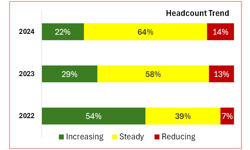Now that you can get your local paper at the garage, at the supermarket or even, possibly, from a dump bin at the station, it might seem that the independent newsagent's days are numbered.
After all, even Mike Stanton at the NFRN admits that the number of newsagents has declined over the past decade – though he points out that's hardly surprising, given that newspaper circulations have also fallen.
But, as Lynne Anderson at the Newspaper Society says, "independent newsagents are hugely important to regional publications - we certainly shouldn't be writing them off."
Indeed, independent newsagents are still responsible for a high proportion of sales of local papers – both through home delivery and off the shelf. Mintel estimated last year that nearly half the total sales of UK regional newspapers were still handled through CTNs and independent newsagents with the multiple newsagents shifting less than a quarter of copies. And, while the supermarkets have made inroads into sales of the nationals and of magazines, their share of the regional press was only 12 percent. So the independent is still a key link in the supply chain for the local newspaper.
But relations between publishers and newsagents aren't always harmonious. Mike Stanton of the NFRN says, "the relationship, from my experience, varies hugely depending on the publisher. But everywhere, the regional newspapers are hugely important to the independent newsagents, and you'll often find them selling more of the local paper than of the nationals."
Contrasting views
Two newsagents give very different views of this relationship. Mike Brown of Browns Newsagents in Stokesley, near Middlesborough, says that in his area, relationships between the regional papers and the newsagents are good. He deals with a number of local papers including the Evening Gazette (Trinity Mirror), Yorkshire Post (Johnston Press), and Northern Echo (Newsquest).
On the other hand, Tom Searle, who runs Sutherlands newsagents in Wimbledon Village, says that London newsagents are having a hard time with the Evening Standard. "One of my colleagues in Central London has even stopped selling it," he says. "I last spoke to them three years ago, and I just don't think they're interested in the independent newsagent."
Even Mike Brown with his sanguine view of the sector admits that "the newspapers probably prefer to deal with multiples as there's just one head office to talk to – whereas we're all individual shops with individual owners."
It seems odd that such widely divergent experiences can be found within a single sector. There's no doubt that the relationship can work well. But independent newsagents are a demanding bunch – and some of the things they need aren't always obvious to publishers.
Delivery times
Colin Livingstone at Cumbrian Newspapers admits his relationship with independent newsagents has been problematic. "What the newsagents thought of us isn't printable!" he says – printing delays meant issues were not getting to them on time. And that very basic issue is a major one for the independent newsagent.
Smiths, for instance, opens at eight – but many agents open earlier, and for home deliveries they need to have the papers going out of the shop by six or seven in the morning, so they need to get the bundles by four o'clock.
And the business has peaks and troughs within the day's trading too, particularly for evening papers. Three years ago, Cumbrian Newspapers did some in depth research to find out when newsagents needed their copies. The results were interesting. For instance, outlets near schools need a delivery at two o'clock, to get the papers on sale to parents picking up children later that afternoon.
"The company had to change," Colin says. Friday's paper now goes to press an hour earlier, to get it into the shops before the schools close. And newsagents near schools are given priority on that delivery, "even if it means rearranging the van run so it goes past a couple of garages and has to go back later. That's all down to the local knowledge in the sales team."
He points out that garages are not demanding customers – because they don't make much money out of newspapers. "If the papers are there they sell them, and they don’t if not – but for the independents, it's their lifeblood." From the publisher's point of view, it's the difference between a low or nil sales effort with relatively little promotion (in some garages there are not even any point of sale materials, just a pile of papers on the counter), and having a retail outlet that is actively promoting the newspaper.
Coincidentally, Archant has also missed some of its delivery deadlines with the Evening News in Norwich, as it's been bedding down a new press at Thorpe and, as always, there has been teething problems. But Philip Preston says, "we directly distribute our own titles, so we can pull out all the stops to get the copies out on time."
And, like Cumbrian, Archant has brought the Evening News forward in its print slot. "It's now available to be distributed by 10.30 in the morning," Philip says.
As well as distributing at the right time, publishers need to distribute the right amount. "We need extra copies when there's a big local story," says Mike Brown, and points out that there's no point a publisher putting on a promotion to increase sales, if they don't then increase the number of copies they supply to their newsagents!
Segmenting your newsagents
Archant divides its newsagents into 'premier agents' – who have to do home deliveries, as well as selling a certain number of copies – and the rest. Premier agents get enhanced terms of 27.5 percent - "so we are rewarding them quite well," Philip Preston admits. The division seems to work well since it allows Archant to reward newsagents who are making a real effort, while not giving away margin to convenience stores which sell just a small number of copies.
Colin Livingstone says Cumbrian also focuses its effort on helping its best independents. "Point of sale is vital for off the shelf sales," he says, "and we've moved our point of sales material up to the quality end of the market." But that costs £140 a unit – whereas previously, the company was only spending £30-40. So Cumbrian has had to concentrate that investment where it can do the most good.
Promotions & merchandising
Special promotions can also increase sales to the benefit of both newsagent and publisher. Mike Brown rates the promotions provided by his local papers. "We just had a good promotion with GNER, and it did increase sales. And we get point of sale stuff we can use, and that helps." He believes the papers' merchandising teams are crucial in helping oil the wheels here. Publishers need to sell actively to their newsagents, and to get involved in increasing copy sales, rather than just delivering routinely, he believes.
And this needs to be driven down to a level of detail. For instance, the Northern Echo has recently offered newsagents particular incentives for increasing sales through double facing. That, says Mike Brown, has worked well for him – as well as for the publisher.
The commitment required from the publisher can be considerable. Cumbrian, for example, now has a team of four merchandisers, up from just one a few years ago. That is quite a sizable cost centre and in the current environment it's just the kind of cost the accountants like to cut, but Colin believes it's needed to keep sales on track. Besides, he says, if they're needed to get deliveries done on a Friday afternoon they're ready to muck in – as he is himself.
Archant also believes in promotions as a means to increase sales - Philip Preston says that the Eastern Daily Press and Evening News in Norwich are "quite active in terms of in-store promotions." He also believes in cross-promoting different titles in the range - linking dailies and weeklies with a discount for dual readership, for instance.
And local newspapers can offer promotions at local level where the national papers can't. For instance, Lynn Anderson says "local events work very well if the newspaper has good relationships - they can promote village fetes with goodie bags." Supermarkets and other multiples are just not flexible enough to handle this type of promotion – this is where the independent has a real advantage.
While you'd expect an independent like Mike Brown to say that "goodie bags for local events are always useful", he also says that "any investment in this area will pay back for the publisher."
Newsbills, on the other hand, may not be as important as some papers think. Tom Searle says, "we don't have a huge amount of space to show them; and we're 85% delivered copies, so they don't have a huge impact on day to day sales."
Trade terms
Where even the happiest relationships can come unstuck is over the terms of trade. Here again there's a very mixed picture across the board with some groups noted for cutting their distributors' margins while others pride themselves on keeping their newsagents in profit. Cumbrian Newspapers prides itself that it's not cut terms on the weekly for the past nine years – on the daily, they promote home delivery by giving 28%, though that reduces to 20% for non-delivery outlets.
Some papers have slipped in small declines in the percentage margin by putting up the cover price but keeping terms the same. Mike Brown says the Evening Gazette did this a while ago – and if they think he didn't notice, they're wrong! But while this is a regular gripe, most agents accept some slippage happens, and they may try to make it back on the rate for insertions.
But Tom Searle believes Associated Newspapers has gone beyond the limits of acceptability with their recent moves. "We were a bit surprised when the Standard raised the cover price by 25p and cut their terms at the same time, from 28 to 25 percent, together with the launch of London Lite. I'm now out of pocket, as the price increase has caused me to lose more than ten percent of my turnover."
He believes it's actions like this that are causing the decline in the numbers of independent agents, by not giving them enough margin to survive. "We're now seeing an inexorable downward pressure on our margins, and that goes alongside wholesalers increasing their carriage service charges."
Mike Stanton confirms that terms have not moved in the agent's favour; "newspapers, both regional and national, have reduced their margins over the years, and this is on a fixed price product." But, he says, at least the regionals have had generally stable cover prices, with no price wars like the nationals, and this has helped create a firm and profitable business for most agents.
Impact of frees
The real bone of contention for many newsagents, though, is the growth of free newspapers. By cutting the newsagent out of the loop, these threaten not just the agent's profit margin but his entire business.
There's an interesting difference, though, in the way that Associated’s London Lite and Guardian Media Group owned Manchester Evening News have gone about it. London Lite is competing with the retailer, while MEN is paying newsagents to stock the free edition. This not only recognises their place in the distribution chain – it keeps consumers thinking of the newsagent as their main print media provider, whether they're paying for it or not.
Lynne Anderson says, "the MEN obviously feels it's more effective to use retailers rather than just dump bins", in terms of reaching the maximum number of consumers - but the paper is also keeping its supply chain happy.
Tom Searle has strong words for the Standard. "The circulation department needs to look seriously at what they're doing with these free copies – it's a very short term view they're taking." And, though he doesn't use the word himself, he has heard other local agents call the Standard's actions "betrayal".
Philip Preston admits that Archant will have to look at all the options for its evening paper. Competition from free internet sites such as Freecycle and Craigslist forces publishers to think hard about the way forward. But he's concerned that newsagents aren't killed off by free papers. That would certainly be a major consideration for Archant, and he favours the MEN route.
Home delivery
As well as distrusting the free papers, many newsagents are suspicious that the publishers want to cut them out of home delivery too. And home delivery remains vastly important for many agents, forming their major differentiation from the multiples.
Here again, unfortunately, publishers are being driven by forces not under their control – they want to ensure the continuation of home delivery in areas where the only outlet is a multiple that doesn't deliver. Philip Preston again says his decisions on the issue are driven at least partly by considering the interests of the independent newsagents.
Archant does deliver in Wymondham, he says, but it has made a commitment that it will not deliver in any area where one of its premier newsagents operates. Effectively, that makes Archant's policy the reverse of a cherrypicking strategy – picking only those areas where there's not enough profit to make it worth a newsagent's while.
Mike Stanton believes this is an issue where the publishers need to work together with newsagents. "If this issue is handled well, there's potential for all," he says – but obviously, there is a risk that it won't be.
There are obviously a number of thorny issues facing both newsagents and publishers right now. Publishers are under pressure from the internet, from falling circulations and new competitors for advertising; newsagents are being squeezed by supermarkets, by garages, and by free newspapers. And it doesn't seem that the pressure is going to let up – if anything, it's getting worse.
So, what's the key to a good relationship? First, of course, the publisher has to want to make it work – and it seems that some publishers may have taken the decision that if the independent newsagent is on his way out, the quicker he goes, the better. Others, though, value their independents highly – Philip Preston says he would find it not just sad, but horrifying, if the independent sector disappeared.
And next, there has to be good, and frequent, communication between the publisher and the newsagents. What's interesting about the contrast between Mike Brown and Tom Searle is that it's not just the contrast between a happy and an unhappy newsagent – it's the contrast between one who talks to his local papers all the time, and another who hasn't spoken to his in three years.
Philip Preston says it's not that difficult, after all. "You've just got to be on the front foot with it and talk to your newsagents. They'd soon let us know if we were doing the wrong thing. And, after all, these guys are businessmen – and they're vital to us."
FEATURE
Local Press and the Independent Newsagent
The growth of digital media and declining circulations have conspired to put huge pressure on the publisher-newsagent relationship; a relationship that has, more many years, been the lynchpin of newspaper sales. Andrea Kirkby looks at the state of play and whether the relationship has a future.










